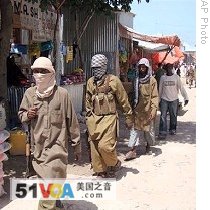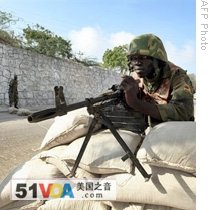Addis Ababa
10 July 2009
 |
| Armed Al-Shabaab fighters patrol Bakara Market in Mogadishu, Somalia, 29 Jun 2009 |
Six Horn of Africa countries comprising the Intergovernmental Authority on Development, or IGAD, met in extraordinary session Friday with representatives of the African Union and the United Nations. The subject was how to save Somalia's embattled government from imminent collapse.
A day after the U.N. Security Council threatened sanctions against regional rogue state Eritrea, Ethiopia's Foreign Minister Seyoum Mesfin said Somalia's conflict has changed from a civil war to a foreign invasion by forces hoping to create a radical Islamic state.
"The fighting is no longer between and among Somalis," he said. "It is a war of aggression on Somalia by external enemies, including al-Qaida."
Somalia's Foreign Minister Mohamed Abdilahi Omaar warned that radical Islamist fighters are arriving by the thousands.
"The current war in Somalia is a foreign war, led and supported by from outside the country," he said. "The leaders and the commanders of the armies are foreign, money comes from outside, ideology and political intentions, and programs are foreign based."
The U.N. Security Council is considering a request by the African Union and IGAD for tough measures to stop the foreign influx, including a naval blockade and a no-fly zone. Experts, however, say those measures will take months to implement, and would likely have limited effect in patrolling Africa's longest coastline.
What may be more timely is a rapid infusion of new forces to the African Union Peacekeeping force known as AMISOM, which is currently at only a little more than half its authorized strength of 8,000, and giving them authority to use force rather than simply to defend themselves.
 |
| Africa Union peacekeepers man the entrance to the presidential palace in the embattled Somalia capital Mogadishu, 23 Feb 2009 |
"Even though the insurgents have so far not achieved their objectives, there is credible information that they are moving their forces into strategic positions in preparation for another major offensive," said Wane. "This of course calls for enhanced continued response by the AU and IGAD with the support of our partners in the international community."
Uganda and Burundi provide almost the entire AMISOM force at present. Both have pledged to send more, but the dispatch of troops has been delayed by technical issues. Other potential troop contributions appear to be month or years away
The IGAD countries, Ethiopia, Kenya, Sudan, Uganda, Djibouti and Somalia, are appealing to the U.N. Security Council to repeal part of an earlier resolution that prohibits Somalia's neighbors from contributing troops to AMISOM.
The United States recently delivered a $10 million package of weapons and training to Somali government forces. But military experts say it will take much more, including air and naval capability, to stop the well-trained and well-financed foreign fighters.